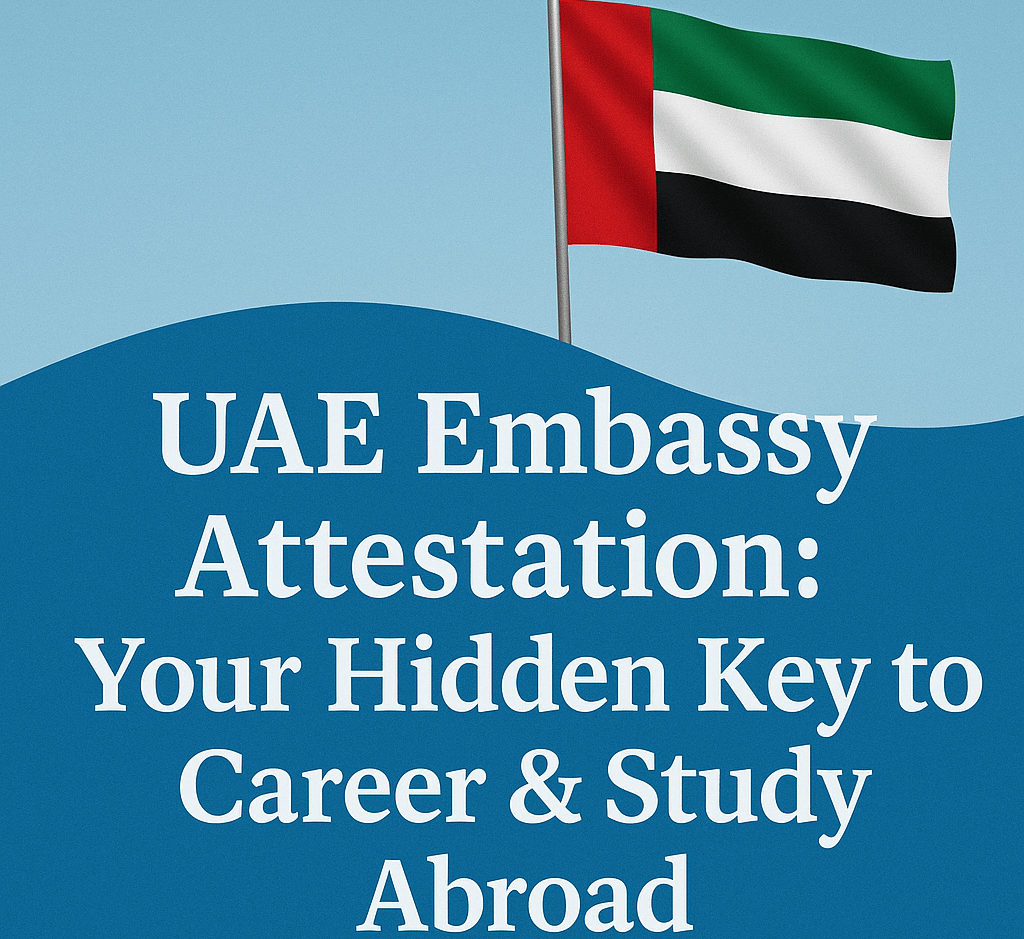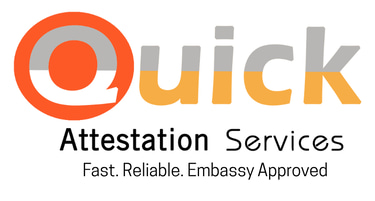UAE Embassy Attestation: Your Hidden Key to Career & Study Abroad
The Attestation Blueprint – How to Fast-Track Your UAE Plans
8/13/20254 min read


Understanding UAE Embassy Attestation
UAE embassy attestation serves as a formal procedure in which the authenticity of documents is verified by the Embassy of the United Arab Emirates. This process is vital for individuals intending to pursue employment, education, or residency in the UAE. Attestation guarantees that the documents presented are legitimate and can be deemed acceptable by local authorities, thus avoiding fraudulent claims. The legal significance of this process cannot be understated, as it adds an important layer of validation that is recognized across borders.
The types of documents frequently subjected to UAE embassy attestation encompass various categories, including educational certificates, marriage certificates, and commercial documents. Educational certificates typically involve degrees or diplomas obtained from recognized institutions, while marriage certificates generally pertain to legal marital status and relationships. Commercial documents might include, but are not limited to, incorporation certificates and business agreements, which are essential for conducting business activities in the UAE.
Attesting these documents is crucial for several reasons. First and foremost, it is often a mandatory requirement for employment applications within the UAE, as employers seek verified credentials to ensure they are hiring qualified candidates. Furthermore, for students aspiring to study in the UAE, attested educational documents are often a prerequisite for admission to academic institutions. Lastly, for those looking to obtain residency or work permits, having proper documentation attested by the UAE embassy is essential in complying with local laws, thereby streamlining the process for legal residency. Ultimately, the UAE embassy attestation is a critical step that safeguards and validates an individual’s documents, facilitating their ambitions of career advancement or academic pursuits abroad.
The Attestation Process: Step-by-Step Guide
Attesting your documents by the UAE embassy is an essential step for those planning to study or work in the United Arab Emirates. This process ensures that your paperwork is recognized and accepted by relevant authorities within the country. Here’s a comprehensive step-by-step guide to help navigate the attestation procedure smoothly.
First, you will need to identify the documents that require attestation. Commonly required documents include educational certificates, birth certificates, marriage certificates, and professional qualifications. Each of these documents must be in original format along with a set of photocopies.
Next, prepare your documents by obtaining a relevant authentication or verification from the issuing authority. For educational certificates, this often involves getting endorsement from the Ministry of Education in your home country, while for professional documents, verification from the respective licensing authority might be necessary. This step is crucial, as the UAE embassy will only accept documents that have been properly verified.
Once the preliminary verification is complete, you can proceed with the attestation. Visit the official UAE embassy or consulate in your country, or check if there are authorized service providers that can handle the process on your behalf. Ensure that you have all necessary documents, along with any application forms required by the embassy.
The fees for attestation can vary based on the type of document and the embassy's specific policies. It's advisable to check the latest fee structure on the embassy's official website before initiating the process. Generally, you should expect to receive your attested documents within a few working days, although this can vary depending on the embassy's workload.
In conclusion, following these steps meticulously will significantly reduce the chances of delays and ensure your documents are attested correctly for their intended purposes.
Benefits of UAE Embassy Attestation for Career Opportunities
Obtaining UAE embassy attestation for your qualifications and legal documents serves as a significant stepping stone while pursuing career opportunities abroad. This process involves the verification of your academic and professional credentials, ensuring they meet the standards set by the UAE government. One of the primary benefits of UAE embassy attestation is the enhancement of employability. Employers often look for candidates with verified qualifications, as this demonstrates professionalism and dedication to authenticity. By providing attested documents, potential candidates showcase their commitment to adhering to international norms, which can be appealing to hiring managers in the competitive job market.
Moreover, attestation bolsters credibility with prospective employers. When your credentials are attested, it adds an additional layer of trust, confirming not just the authenticity of the documents, but also the quality of the education and training received. For instance, individuals from countries with less recognized educational institutions may find it particularly advantageous to pursue attestation, as it lends greater weight to their qualifications and helps distinguish them from other applicants.
In addition to enhancing employability and credibility, UAE embassy attestation is often a legal requirement for working in the UAE. Many employers in the region necessitate this process to ensure that all employees meet the local regulations. Failure to comply with these legal prerequisites can result in job offers being rescinded or lacking necessary work permits. A prime example of this can be seen with several expatriates who initially faced hurdles securing employment due to unverified documents. However, after undergoing the attestation process, they successfully obtained jobs in their respective fields. The impact of UAE embassy attestation on their career trajectory highlights its integral role in offering better opportunities and minimizing legal complexities.
Impact on Educational Opportunities Abroad
UAE embassy attestation serves as a pivotal element for individuals looking to further their education in foreign institutions. This process entails the authentication of educational documents, which is essential when applying to universities or colleges outside the United Arab Emirates. Attestation validates the degrees, diplomas, and transcripts issued by educational institutions in the UAE, ensuring that they are recognized and accepted by international educational bodies.
When students intend to study abroad, they often face a multitude of challenges, one of which is the acceptance of their qualifications by foreign universities. The attestation process, therefore, becomes an invaluable asset. By acquiring UAE embassy attestation, students can significantly enhance the credibility of their academic records. Many foreign institutions require proof that the degrees or certificates presented have been officially verified, as this assurance allows them to ascertain the authenticity of the documents. Thus, attestation directly impacts a student’s eligibility for courses and scholarship opportunities, as educational bodies worldwide have specific requirements regarding document validation.
Moreover, the recognition of UAE-validated documents can ease the admission process. Institutions in countries such as the United States, Canada, and Australia often rely on attested documents to expediently assess applicants' academic backgrounds. This recognition fosters a smoother transition into foreign education systems and can quickly translate into increased acceptance rates. Furthermore, having attested documents may open additional doors for further educational pursuits, including postgraduate programs and research opportunities in various fields.
In conclusion, UAE embassy attestation plays a crucial role in shaping educational pathways for students aspiring to pursue their studies abroad. Through this process, individuals can not only validate their qualifications but also enhance their prospects for admission into reputable international institutions.
